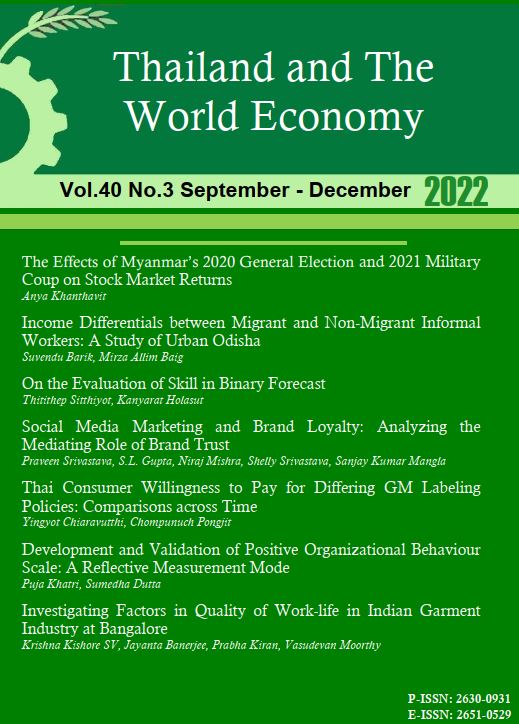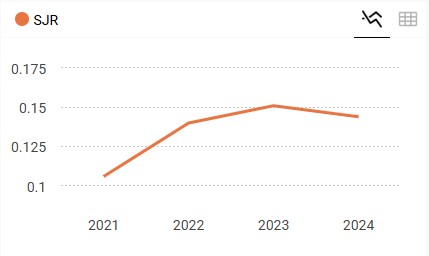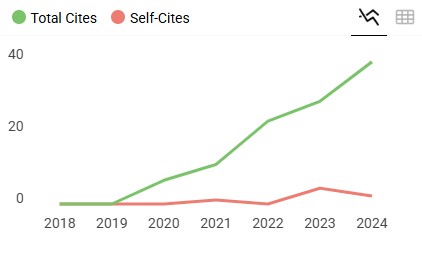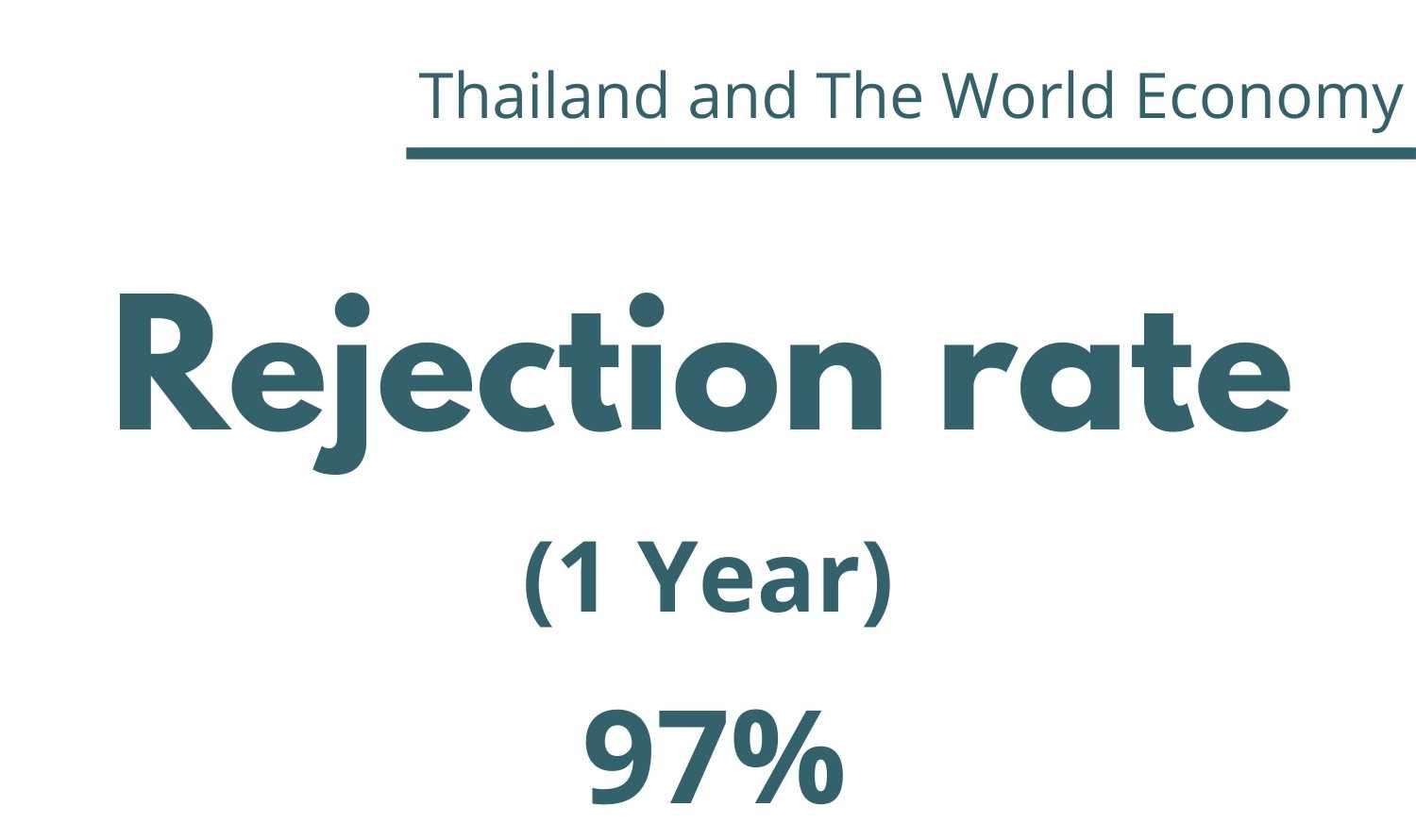The Effects of Myanmar’s 2020 General Election and 2021 Military Coup on Stock Market Returns
Keywords:
Abnormal Return, Event-Study Analyses, Myanmar Stock market, Political UncertaintyAbstract
Stock market returns are driven by political events. Investors adjust their behavior and reallocate their investments with respect to them. This study examines the effects of Myanmar’s 2020 general election and 2021 military coup on the Yangon Stock Exchange’s (YSX) returns. Myanmar is one of the fastest growing economies in the world, whereas its stock market is young and very small. This study applies the event-conditioning Kalman-filter regression which allows the normal returns to move randomly. The data are returns on the Myanmar Stock Price Index portfolio. The sample period is from May 29, 2020 to February 18, 2021 (171 daily observations). This study finds significant effects of the election and the coup. The daily-average abnormal returns during the first and second five-day periods prior to the election day are 0.2129% and 0.5596%, respectively, and are significant. However, these returns are non-significant on or after the election day. The abnormal returns associated with the coup, at –7.1141%, is significant only on the day of the coup. Although the market is only six years old and lists just six stocks, the stock market price is still able to reflect information on these political events.
References
Ahmed, W. M. A. (2017). The impact of foreign equity flows on market volatility during politically tranquil and turbulent times: The Egyptian experience. Research in International Business and Finance, 40, 61‒77.
Ahmed, S., Alam, K., Rashid, A., & Gow, J. (2020). Militarisation, energy consumption, CO2 emissions and economic growth in Myanmar. Defence and Peace Economics, 31 (6), 615‒641.
Alam, M. N., Alam, M. S., & Chavali, K. (2020). Stock market response during COVID-19 lockdown period in India: An event study. Journal of Asian Finance, Economics andBusiness, 7 (7), 131–137.
Alsharairi, M., & Abubaker, W. (2016). Does Arab Spring have a spillover effect on Dubai financial market? Journal of Developing Areas, 50 (6), 319‒331. Retrieved from https://www.jstor.org/stable/10.2307/26415669
Acemoglu, D., Naidu, S., Restrepo, P., & Robinson, J. A. (2019). Democracy does cause growth. Journal of Political Economy, 127 (1), 47‒100.
Aung San Suu Kyi’s ruling party claims resounding election win in Myanmar. (2020, November 10). CNN. Retrieved from https://edition.cnn.com/2020/11/09/
asia/myanmar-election-results-nld-intl-hnk/index.html
Avrutskaya, S., & Maricheva, E. (2021). Testing Russian stock market efficiency using event studies: Impact of credit ratings changes. Journal of Corporate Finance Research, 15 (2), 42‒54.
Brown, K. C., Harlow, W. V., & Tinic, S. M. (1988). Risk aversion, uncertain information, and market efficiency. Journal of Financial Economics, 22 (2), 355‒385.
Brown, S. J., & Warner, J. B. (1985). Using daily stock returns: The case of event studies. Journal of Financial Economics, 14 (1), 3‒31.
Bünte, M., Köllner, P., & Roewer, R. (2020). Taking stock of Myanmar’s political
transformation since 2011. Journal of Current Southeast Asian Affairs, 38 (3), 249‒264.
Civilize, S., Wongchoti, U., & Young, M. (2015). Military regimes and stock market performance. Emerging Markets Review, 22, 76‒95.
Dai, L., & Zhang, B. (2019). Political uncertainty and finance: A survey. Asia-Pacific Journal of Financial Studies, 48 (3), 307‒333.
Duggan, C. S. M. (2004). Do different coups have different implications for investment? Some intuitions and a test with a new dataset (Working Paper). California: Stanford University. Retrieved from http://citeseerx.ist.psu.edu/
viewdoc/download?doi=10.1.1.406.5882&rep=rep1&type=pdf
Fama, E. F., Fisher, L., Jensen, M. C., & Roll, R. (1969). The adjustment of stock prices to new information. International Economic Review, 10 (1), 1‒21.
Fisher, J. (2020, November 13). Myanmar election: Suu Kyi’s NLD wins landslide victory. BBC News. Retrieved from https://www.bbc.com/news/av/world-asia-34806439
Girardi, D., & Bowles, S. (2018). Institutional shocks and economic outcomes: Allende’s election, Pinochet’s coup and the Santiago stock market. Journal of Development Economics, 134, 16‒27.
Harvey, A. C. (1990). Forecasting, structural time series models and the Kalman Filter. New York: Cambridge University Press.
Hung, L. C. (2013). U.S. presidential elections and the Taiwanese stock market. Issues and Studies, 49 (1), 71‒97. Retrieved from https://www.scopus.com/orderdocument/
form.uri?origin=recordpage&eid=2-s2.0-84879896290
IANS. (2020, November 15). Myanmar’s ruling NLD party grabs majority of parliamentary seats. New Indian Express. Retrieved from https://www.newindianexpress.com/
world/2020/nov/15/myanmars-ruling-nld-party-grabs-majority-of-parliamentary
-seats-2223813.html
Kellerhals, B. P. (2001). Financial pricing models in continuous time and Kalman Filtering. New York: Springer-Verlag.
Khanthavit, A. (2020a). An event study analysis of Thailand’s 2019 general election: A long window of multiple sub-events. International Journal of Financial Research, 11 (4), 502‒514.
Khanthavit, A. (2020b). Foreign investors’ abnormal trading behavior in the time of COVID-19. Journal of Asian Finance, Economics and Business, 7 (9), 63‒74.
Khanthavit, A. (2021a). Measuring COVID-19 effects on world and national stock market returns. Journal of Asian Finance, Economics and Business, 8 (2), 1‒13.
Khanthavit, A. (2021b). A Kalman filtering approach to event study analysis when performance variables are nonstationary. Thailand Statistician, 19 (1), 178‒194. Retrieved from https://ph02.tci-thaijo.org/index.php/thaistat/article/view/242824
Kyaw Soe, H. (2021, January 18). Business positive of reform, policy change in post-election Myanmar. Myanmar Times. Retrieved from https://www.mmtimes.com/
news/businesses-positive-reform-policy-change-post-election-myanmar.html
Kucik, P. (2016). Difficulties in easing sanctions on Myanmar. April 2016. Retrieved from Center on Energy Policy, Columbia University websitehttps://energypolicy.columbia.edu
/sites/default/files/CGEP_Difficulties%20in%20Easing%20Sanctions%20on%20Myanmar_April%202016.pdf
Lehkonen, H., & Heimonen, K. (2015). Democracy, political risks and stock market performance. Journal of International Money and Finance, 59, 77‒99.
Lim, K. P., & Brooks, R. (2011). The evolution of stock market efficiency over time: A survey of the empirical literature. Journal of Economic Surveys, 25 (1), 69–108.
Lührmann, A., & Lindberg, S. I. (2019). A third wave of autocratization is here: What is new about it? Democratization, 26 (7), 1095–1113.
Marston, H. (2021, February 3). Myanmar grabs global attention, again. East Asia Forum. Retrieved from https://www.eastasiaforum.org/2021/02/03/myanmar-grabs-global-attention-again/
Maung, M. (2021, March 14). Targeted sanctions needed against Myanmar’s coup leaders. Human Rights Watch. Retrieved from https://www.hrw.org/news/2021
/03/15/targeted-sanctions-needed-against-myanmars-coup-leaders
Military coup fears overshadow Myanmar parliament opening. (2021, January 29). China Daily. Retrieved from https://www.chinadailyasia.com/article/156405
Myanmar sets November 8 date for general election. (2020, July 2). Al Jazeera. Retrieved from https://www.aljazeera.com/news/2020/7/2/myanmar-sets-november-8-date-for-general-election
Nazir, M. S., Younus, H., Kaleem, A., & Anwar, Z. (2014). Impact of political events on stock market returns: Empirical evidence from Pakistan. Journal of Economic and Administrative Sciences, 30 (1), 60–78.
Newey, W. K., & West, K. D. (1987). A simple, positive semi-definite, heteroskedasticity and autocorrelation consistent covariance matrix. Econometrica, 55 (3), 703–708.
Obradović, S., & Tomić, N. (2017). The effect of presidential election in the USA on stock return flow—A study of a political event. Economic Research-Ekonomska Istraživanja, 30 (1), 112‒124.
Ockey, J. (1994). Political parties, factions, and corruption in Thailand. Modern Asian Studies, 28 (2), 251‒277.
Oehler, A., Walker, T. J., & Wendt, S. (2013). Effects of election results on stock price performance: Evidence from 1980 to 2008. Managerial Finance, 39 (8), 714‒736.
Pantzalis, C., Stangeland, D. A., & Turtle, H. J. (2000). Political elections and the resolution of uncertainty: The international evidence. Journal of Banking and Finance, 24 (10), 1575‒1604.
Park, N. K. (2004). A guide to using event study methods in multi-country settings. Strategic Management Journal, 25 (7), 655‒668.
Peterson, P. P. (1989). Event studies: A review of issues and methodology. Quarterly Journal of Business and Economics, 28 (3), 36‒66. Retrieved from https://www.jstor.org/stable/40472954?seq=1
Plecher, H. (2021, February 10). Growth of the global gross domestic product (GDP) 2025. Retrieved from https://www.statista.com/statistics/273951/growth-of-the-global-gross-domestic-product-gdp/
Radio Free Asia. (2021, January 28). Myanmar’s military refuses to rule out coup over election fraud claims. VOA News. Retrieved from https://www.voanews.com/
east-asia-pacific/myanmars-military-refuses-rule-out-coup-over-election-fraud-claims
Ratcliffe, R. (2021, November 6). Myanmar minorities, including Rohingya, excluded from voting in election. Guardian. Retrieved from https://www.theguardian.com/world/
/nov/06/myanmar-minorities-rohingya-excluded-voting-election-poll-aung-san-suu-kyi-rights
Shannon, M., Thyne, C., Hayden, S., & Dugan, A. (2015). The international community’s reaction to coups. Foreign Policy Analysis, 11 (4), 363‒376.
Takeyama, Y. (2018). Recent developments of the Myanmar economy. May 2018. Tokyo: Institute for International Monetary Affairs. Retrieved from https://www.iima.or.jp/en/docs/newsletter/2018/NL2018No_6_e.pdf
Timeline of events in Myanmar since February 1 coup. (2021a, February 21). Al Jazeera. Retrieved from https://www.aljazeera.com/news/2021/2/23/timeline-of-events-in-myanmar-since-february-1-coup
Trading Economics. (2021). Myanmar GDP annual growth rate. Retrieved from https://tradingeconomics.com/myanmar/gdp-growth-annual
UN condemns Myanmar violence as US sanctions general’s children. (2021b, March 10). Al Jazeera. Retrieved from https://www.aljazeera.com/news/2021/3/10/us-imposes-sanctions-on-children-of-myanmar-military-leader
Wai, K. S. (2021, January 25). Rakhine to start immunization of health workers on January 27. Myanmar Times. Retrieved from https://www.mmtimes.com/
news/rakhine-start-immunisation-health-workers-january-27.html
Wang, Y. H., & Lin, C. T. (2009). The political uncertainty and stock market behavior in emerging democracy: The case of Taiwan. Quality and Quantity, 43 (2), 237‒248.
World Bank. (2021). The World Bank in Myanmar. Washington, DC: World Bank. Retrieved from http://ida.worldbank.org/results/myanmar#:~:text=Myanmar%2C
%20a%20lower%2Dmiddle%20income,and%20Pacific%20region%20and%20globally.
Yangon Stock Exchange. (2021). Company list. Retrieved from https://ysx-mm.com/main-board/
listing/company/
Downloads
Published
How to Cite
Issue
Section
License

This work is licensed under a Creative Commons Attribution-NonCommercial-NoDerivatives 4.0 International License.










